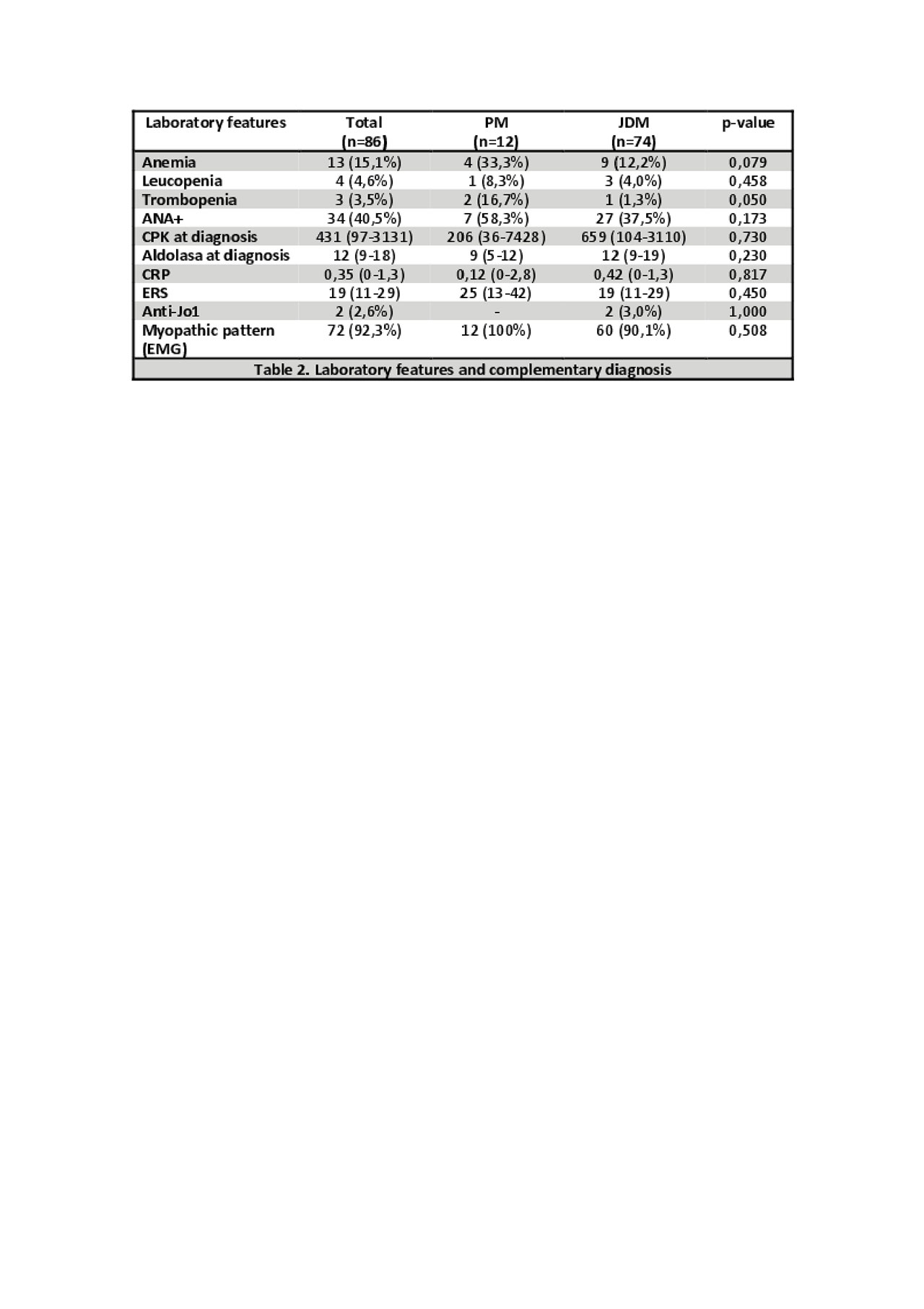Session Information
Session Type: Poster Session (Sunday)
Session Time: 9:00AM-11:00AM
Background/Purpose: Juvenile idiopathic inflammatory myopathies (JIIM) are a heterogeneous group of autoimmune diseases affecting children, characterized by symmetric muscular weakness, cutaneous rash and systemic organ involvement. The clinical manifestations of the IIMs differ between children and adults, for example, JIIM have a higher prevalence of calcinosis, lipodystrophy and vasculopathy, as well as a minor incidence of neoplastic disease or interstitial pneumonia. Given the low incidence of the JIIM, there are few studies describing the characteristics of this disease and its different subtypes.
The objective of this study is to describe the demographic, clinical and analytical characteristics of patients with JIIM from the multicentric REMICAM registry, and to compare those measures between polymyositis (PM) and juvenile dermatomyositis (JDM) subgroups.
Methods: A multicenter retrospective study from the REMICAM registry was performed. Patients were selected if they were 18 years or younger at onset of JIIM and met definite or probable criteria for IIM as defined by the modified Bohan and Peter criteria. We included patients with JDM or PM subgroups, overlap myositis patients were excluded.
Results: A total of 86 patients were included, 12 (14%) classified as PM and 74 (86%) as JDM. 70% were women, most of the subjects were Caucasian (96%). Disease characteristics are shown in Table 1. 13% of the patients had fever and 15% weight loss. Regarding musculoskeletal manifestations, 44% and 28% had arthralgias and arthritis, respectively, and 93% presented muscular weakness. Gottron sign was present in 76% of the patients, and calcinosis was present in 31.4%. CPK and aldolase levels at diagnosis are 431 U/L and 8 U/L respectively. Antinuclear antibody (ANA) was positive in 40% of the sample, but only 2 cases were anti-Jo1 positive. The rest of the complementary analysis are shown in table 2.
Conclusion: JDM was the most frequent clinical form of JIIM in our study, which corresponded to more than 80% of the cases, like other cohorts. The most frequent manifestations in patients with JIIM of our registry were the muscular and dermatological ones, but an important group also presented arthralgia/arthritis and fever. There was no statistical difference between both groups, regardless, cutaneous manifestations, myalgias and dysphagia were more common in JDM group, as well as higher CPK values and aldolase. PM group patients were older at diagnosis, had more fever and arthritis, also, cytopenia and ANA positivity were more frequent in this subtype.
To cite this abstract in AMA style:
Loarce-Martos J, Larena C, Blázquez M, Joven-Ibáñez B, Carreira P, Martinez Barrio J, López-Longo F, Lopez-Robledillo J, Almodovar-Gonzalez R, Llorente I, Tomero-Muriel E, García-De La Peña P, Moruno H, Pérez-Gómez A, Cobo-Ibáñez T, García De Yébenes M, Nuño L. Clinical Manifestations and Comparison of Subtypes of Juvenile Idiopathic Inflamatory Myopathies: Data from the REMICAM Registry [abstract]. Arthritis Rheumatol. 2019; 71 (suppl 10). https://acrabstracts.org/abstract/clinical-manifestations-and-comparison-of-subtypes-of-juvenile-idiopathic-inflamatory-myopathies-data-from-the-remicam-registry/. Accessed .« Back to 2019 ACR/ARP Annual Meeting
ACR Meeting Abstracts - https://acrabstracts.org/abstract/clinical-manifestations-and-comparison-of-subtypes-of-juvenile-idiopathic-inflamatory-myopathies-data-from-the-remicam-registry/


